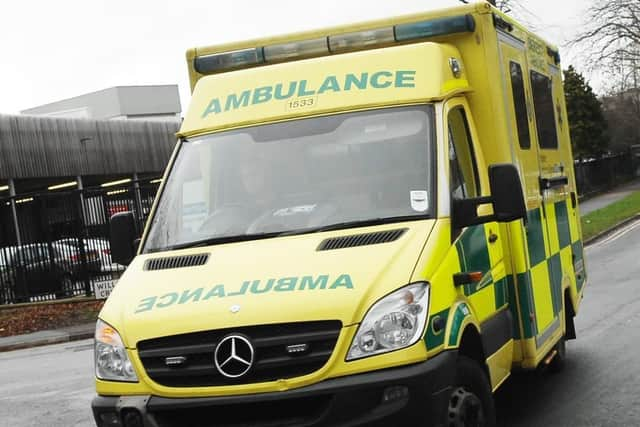Yorkshire Ambulance Service issues public plea amid concerns long waiting times are putting lives at risk
and live on Freeview channel 276
Yorkshire Ambulance Service' s average response time for the most urgent ‘category one’ calls to help people with life-threatening illnesses or injuries such as those going into cardiac arrest during October was 11 minutes and 4 seconds, new statistics show.
That is well over the seven-minute target time and is the second longest of any ambulance trust, behind only South Western Ambulance Service, data published by NHS England on Thursday, November 11 reveals.
Advertisement
Hide AdAdvertisement
Hide AdThe trust also took an average of nearly three minutes – 166 seconds, to be precise – to answer calls made during the period.


That’s longer than callers were left waiting on the phone to any other trust, ahead of South Western Ambulance Service on 133 seconds, with no other trust having an average caller waiting time of longer than 100 seconds.
Richard Webber, a spokesman for the College of Paramedics and a working paramedic, told the BBC patients across the country were being put at risk because they were waiting so long.
He said: “Every day services are holding hundreds of 999 calls with no-one to send.
Advertisement
Hide AdAdvertisement
Hide Ad“The ambulance service is simply not providing the levels of service they should - patients are waiting too long and that is putting them at risk.”
The latest NHS figures show Yorkshire Ambulance Service received 108,746 calls last month compared with 83,505 in October 2019, before the Covid pandemic – an increase of 30 per cent.
A spokesperson for the trust said: “We are continuing to experience high demand for our services and we constantly monitor the situation.
“Our dedicated staff are working very hard to make sure patients can get the care they require and we continue to work closely with NHS partners in Yorkshire and the Humber to ensure there is a joined-up approach to patient care.
Advertisement
Hide AdAdvertisement
Hide Ad“We continue to remind the public to help us by only calling 999 in serious or life-threatening emergencies to allow us to focus our efforts on our most poorly patients.”
Yorkshire Ambulance Service performed better last month when it came to response times for category two (emergency) and category three (urgent) calls.
It took 43m40s on average to reach category two patients, which include those who have suffered heart attacks, strokes and burns, which was shorter than the England-wide mean of 53m54s but outside the 18-minute target.
And it took 2h22m to get to category three patients, which was less than the national average of 3h10m but longer than the two-hour target.
Advertisement
Hide AdAdvertisement
Hide AdIn June, The Star reported how a teenage footballer waited seven hours in agony for an ambulance after dislocating his knee.
The NHS Confederation told the BBC the ambulance service was dealing with ‘normal winter pressures’ coupled with a ‘huge amount of pent-up demand’ which had built up during the pandemic.
The Star contacted NHS England which has yet to respond.
Professor Stephen Powis, medical director of the NHS in England, said the ambulance service had had to handle its highest ever number of 999 calls in a single month and praised staff for going ‘above and beyond’.
